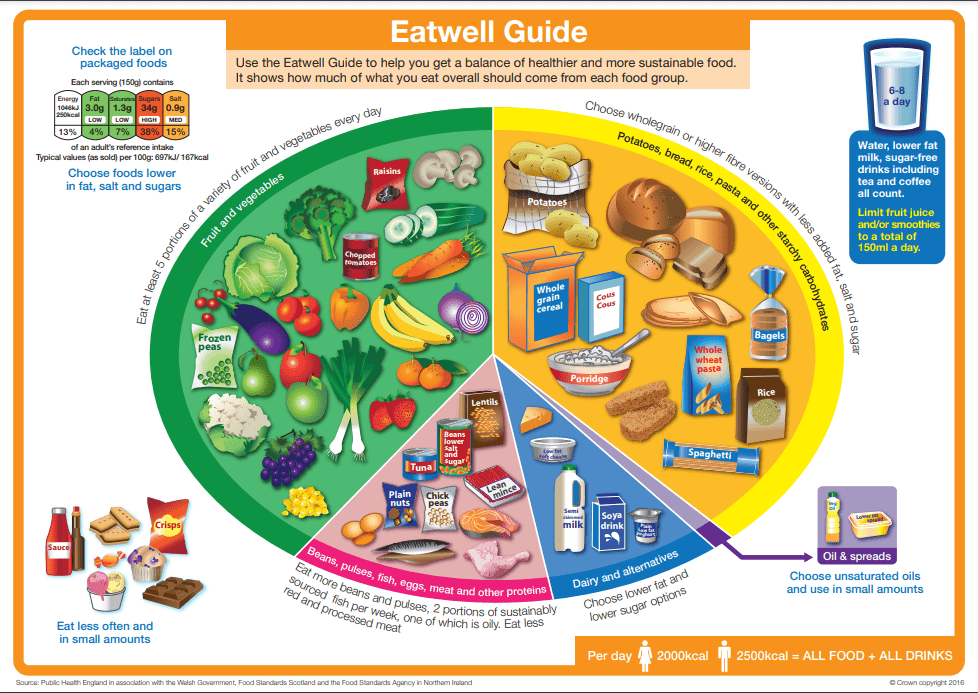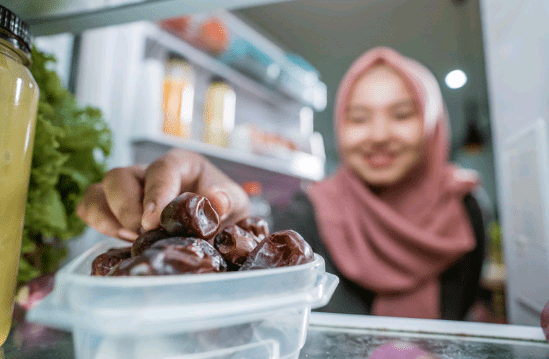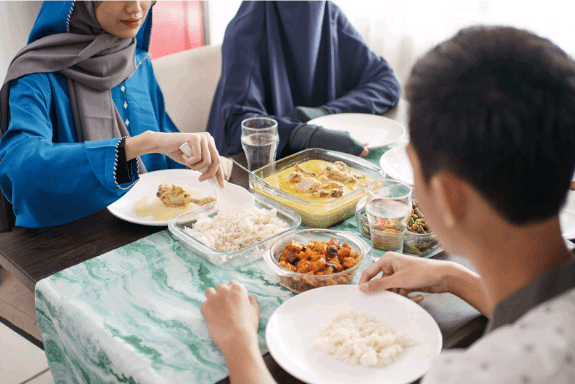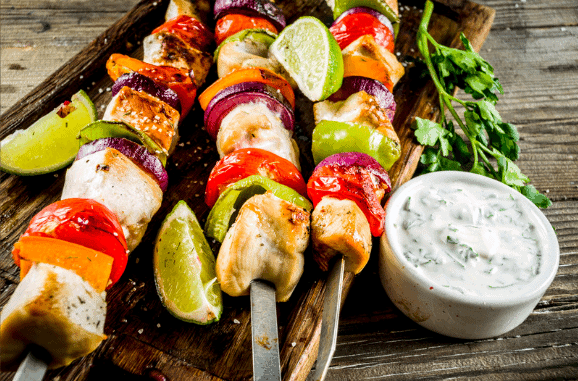Ramadan marks a period of fasting and religious focus for millions of Muslims across the globe. This blog will review some of our top tips for planning meals for a healthy Ramadan.
This year, Ramadan is expected to start on Sunday 10th March 2024, following the sighting of the moon over Mecca. Lasting for 29-30 days, Ramadan will end on Tuesday 9th April 2024. Eid al-Fitr will be celebrated/ observed around the 9th-10th April 2024.
The way in which you approach your diet during the fasting period should be similar to your approach outside of Ramadan- aiming to eat a healthy balanced diet. This is particularly important as you have less time each day to provide your body with all the essential nutrients and fluids you need to be healthy.

Islamic law permits pregnant and breastfeeding women to opt- out of fasting, if they are concerned about their health or the health of their baby. Any missed fasting days can be made up at a later date. However, some pregnant women may still wish to fast but it’s advisable to discuss this with your midwife or GP before doing so. Fasting for children under the age of eight isn’t advisable, but children may start fasting when they reach puberty.
A Balanced Diet
The NHS recommend that if you’re observing the fast, you should have at least two meals a day: the pre-dawn meal (Suhoor) and a meal at dusk (Iftar). Try to make sure you base these meals around the four main food groups (see Eatwell Guide image, below):

- Starchy Foods such as bread, rice, pasta, potatoes and cereals
- Fruits and vegetables
- Protein foods such as beef, chicken, fish, egg, lentils, pulses
- Milk and dairy foods such as cheese and yoghurt.
Try to limit the amount of high fat and sugar foods you eat, as these will not provide you with important nutrients such as iron, calcium and other vitamins and minerals. Foods high in fat and sugar include: crisps, croissants, biscuits, sweets, cake. Eating these foods, even during Ramadan, could result in weight gain as they have a high energy content.
Try to limit salty foods too, such as crisps, processed meat, salted popcorn etc., as salt can increase feelings of thirst.
For more information on how to achieve a healthy, balanced diet, visit the NHS website (opens in new tab).
Suhoor
Try to ensure that Suhoor, the pre-dawn meal, provides you with a wholesome, filling meal to help you maintain energy for a number of hours.
- Good options would include wholemeal bread, such as pitta and toast, and cereals – particularly oats. Try adding milk, fruit and flaked nuts for extra nutrients
- Starchy foods like rice, or couscous are also good options and perfect with added vegetables
- Dairy foods like yoghurt are good sources of calcium and protein and a great accompaniment to other dishes
It’s also a good opportunity to hydrate yourself too. Water, milk and unsweetened fruit juice are good options. If you usually drink caffeinated drinks, such as tea and coffee, you may wish to reduce/ avoid these during Ramadan, as caffeine is a diuretic, meaning water will be lost faster through urination.
Here are some of our favourite recipes:
Overnight Oats (opens in new tab)
Breakfast Couscous (PDF, 280KB)
Falafel with Tzatziki and Pitta Bread (PDF, 1MB)
Iftar
It’s customary for Muslims to break their fast (Iftar) by eating dates, in accordance with the Prophetic traditions. Dates will provide you with a boost of energy, vitamins and minerals. At this time, drink plenty of water, as this will to help to re-hydrate you and reduce the chances of overindulgence.

Iftar meals are often a time of celebration amongst families and friends, where you come together to break your fast. Try not to go overboard when eating during Ramadan, as consuming a lot of deep fried, creamy and sweet foods could cause you to gain weight.
The NHS website advises those observing Ramadan to exercise caution around some of the more rich dishes that are traditionally used to celebrate. These include:
- Deep-fried foods – such as pakoras, samosas and fried dumplings
- High-sugar and high-fat foods – including sweets such as gulab jamun, rasgulla and balushahi
- High-fat cooked foods – such as parathas, oily curries and greasy pastries.
Alternatives include:
- Baked samosas and boiled dumplings – check out our baked vegetable samosa recipe here (PDF, 377KB)
- Chapattis made without oil
- Baked or grilled meat and chicken, beans and lentils – check out our spring vegetable and chickpea couscous (PDF, 652KB)
- Homemade pastry using just a single layer
- Milk-based sweets and puddings, such as rasmalai and barfee.

Cooking Food
It’s a good idea to also consider how food is cooked and prepared.
Limit the amount of oil you use in cooking to help keep the fat content low. For example, try to limit oil to one teaspoon per person in cooking.
Ghee, butter and lard are very high in saturated fat, so try swapping these for healthier vegetable oils, such as rapeseed.
Instead of frying foods, try grilling or baking them. This is a healthier way to cook and helps to retain the taste and flavour of food, especially chicken and fish.

A note on exercise
Some people experience constipation during Ramadan, due to changes to their eating habits. Try to incorporate some gentle exercise during Ramadan, such as walking, as this may help to ease constipation.
Ramadan is great time to make healthy changes to improve your diet, so why not try and keep it going after?! Visit the Early Start Nutrition YouTube (opens in new tab) channel or check out our range of blogs for healthy recipe ideas for the whole family! (opens in new tab)

Recipe Ideas
Spiced Lamb Koftas with Chickpeas – Click here for the recipe card! (PDF, 608KB)
Turmeric Smoothie Bowl – Click here for the recipe card! (PDF, 144KB)
Spiced Carrot and Lentil Soup – Click here for the recipe card! (PDF, 597KB)



thank youbfor your valuable information on a healthy ramadan diet. i shall be incorporating some of your advise into my iftaar ie bake my samosas instead of deep frying them and cutting out sugars like gulab jamun.. thank you once again
Useful Information. Thanks for sharing
Great Information. Thanks for sharing